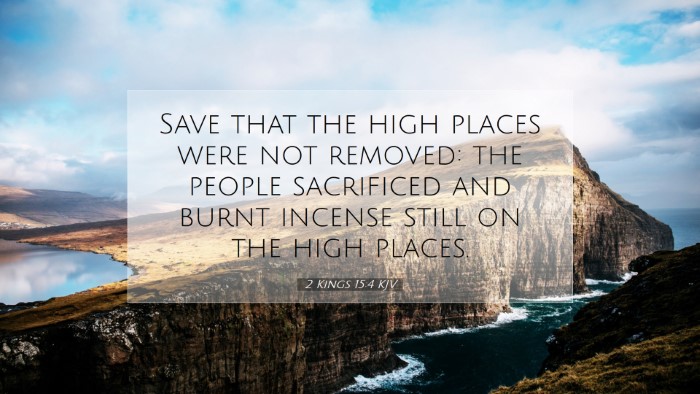Commentary on 2 Kings 15:4
Verse Context: 2 Kings 15:4 states, "Nevertheless, the high places were not taken away: the people still sacrificed and burned incense in the high places." This verse serves as a critical hinge in the narrative of Israel's kings, reflecting both the spiritual state of the nation and the challenges of reform.
Overview
This passage reflects on the reign of Azariah (Uzziah) in Judah and highlights the pervasive issue of idol worship that persisted despite his generally righteous rule. Public domain commentaries from Matthew Henry, Albert Barnes, and Adam Clarke provide insights into not only the historical context but the theological ramifications of these actions and their implications for the people of Judah.
Historical Context and Leadership
Matthew Henry emphasizes that although Azariah did what was right in the sight of the Lord, his failure to remove the high places indicates a compromise with the old idolatrous practices that plagued the nation. This duality in leadership underscores a broader theme in the narrative of the Hebrew kings, where compliance with God’s commandments can be incomplete.
Albert Barnes notes that Azariah's reign was relatively successful politically and economically, yet this success was marred by spiritual neglect. The failure to remove high places reflected not only a lack of zeal for true worship but also an implicit acknowledgment of the people's inclinations towards idolatry.
Theological Implications
The presence of high places signifies a divided heart among the people of Judah. Adam Clarke explains that these locations of worship were steeped in pagan rituals and often led the people away from proper worship of Yahweh. This raises questions about the nature of religious practice, community leadership, and the influence of cultural norms on worship.
- The Nature of Compromise: The unwillingness to confront and dismantle the high places illustrates a compromise that is often seen in the lives of believers today. It warns against partial obedience to God’s commands.
- Spiritual Blindness: The continuation of these practices indicates a spiritual blindness that affects both leaders and the populace, suggesting that leaders bear a significant responsibility for guiding their people towards true worship.
- Judgment and Mercy: The tension between divine judgment and mercy is prevalent—Judah experiences blessings under Azariah while still suffering for their idolatry.
Applications for Today
This verse and its surrounding context encourage pastors, theologians, and scholars to reflect on similar dynamics within the church today. The persistence of cultural idols—whether they are materialism, secularism, or false teachings—remains a pressing concern.
- Teach on Idolatry: Biblical preaching must address the subtle forms of idolatry that exist in modern faith communities, encouraging congregants to identify and renounce these practices.
- Leadership Responsibility: Leaders must be vigilant in promoting true worship practices, preaching against compromise and calling for a return to authentic faith.
- Persistence in Reform: The task of reform is ongoing; it requires diligence, continual prayer, and a deep reliance on God’s guidance through His Word.
Conclusion
2 Kings 15:4 serves as a pivotal reminder of the struggles between faithful leadership and the tendencies of the people towards idolatry. The insights drawn from Henry, Barnes, and Clarke not only illuminate the text but also challenge modern readers to critically assess their own communities and practices.
As scholars and practitioners, may we strive for a complete devotion to God, recognizing the call to cleanse our spiritual practices from the high places that may exist in our lives today.


